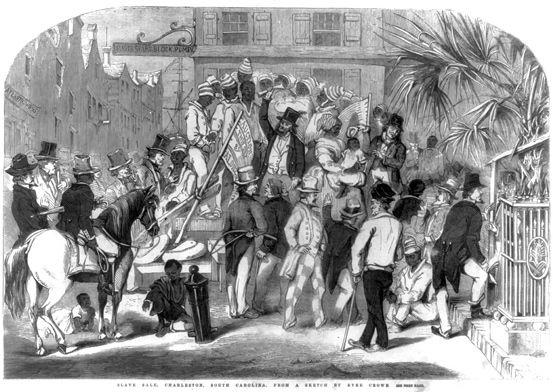You are using an out of date browser. It may not display this or other websites correctly.
You should upgrade or use an alternative browser.
You should upgrade or use an alternative browser.
Disputed 1619 project was CORRECT, Slavery WAS key to US Revolution; Gerald Horne proved in 2014
- Thread starter ☑︎#VoteDemocrat
- Start date
More options
Who Replied?
South Carolina’s Critical Race War on Education, Part 1: Origin story
TheGrio's four-part series explores how South Carolina became the home of the fight against critical race theory and equal education
 thegrio.com
thegrio.com
Yagirlcheatinonus
Icon Poster
It’s real

May 10, 1740 | South Carolina Passes Negro Act of 1740, Codifying White Supremacy
Learn more about our history of racial injustice.
On May 10, 1740: South Carolina Passes Negro Act of 1740, Codifying White Supremacy
On May 10, 1740, the South Carolina Assembly enacted the “Bill for the better ordering and governing of Negroes and other slaves in this province,” also known as the Negro Act of 1740. The law prohibited enslaved African people from growing their own food, learning to read, moving freely, assembling in groups, and earning money. It also authorized white enslavers to whip and kill enslaved Africans for being "rebellious."South Carolina implemented this act after the unsuccessful Stono Rebellion in 1739, in which approximately 50 enslaved Black people resisted bondage and waged an uprising that killed between 20 and 25 white people. In addition to establishing a racial caste and property system in the colony, the assembly sought to prevent any additional rebellions by including provisions that mandated a ratio of one white person for every 10 enslaved people on a plantation. The Negro Act treated enslaved Africans as human chattel and revoked all forms of civil rights.
The law served as a model for other states; Georgia authorized slavery within its borders in 1750 and enacted its own slave code five years later. In 1865, the passage of the Thirteenth Amendment legally abolished slavery in the U.S. except as punishment for crime, but discriminatory Black Codes and Jim Crow laws developed to maintain the oppression of Black people, ensuring that the legacy of the Negro Act of 1740 and similar laws remained present throughout the country for more than two centuries.

Stanley Engerman, Revisionist Scholar of Slavery, Dies at 87 (Published 2023)
His two-volume study, written with Robert W. Fogel, used data to challenge commonly held ideas about American slavery, including that it was unprofitable and inefficient.
Stanley Engerman, Revisionist Scholar of Slavery, Dies at 87
His two-volume study, written with Robert W. Fogel, used data to challenge commonly held ideas about American slavery, including that it was unprofitable and inefficient.
Published May 27, 2023Updated May 30, 2023
A black-and-white photo of Stanley Engerman in his office, leaning against a bookcase packed with books, with gray hair, a pullover sweater with patches on the elbows, and black-rimmed glasses, arms crossed, smiling toward the camera.
The economic historian Stanley Engerman in an undated photo. He argued that slavery, while shameful, was a rational and viable economic system.James Montanus/University of Rochester
Stanley Engerman, one of the authors of a deeply researched book that, wading into the fraught history of American slavery, argued that it was a rational, viable economic system and that enslaved Black people were more efficient workers than free white people in the North, died on May 11 in Watertown, Mass. He was 87.
His son David said the cause was myelodysplastic syndrome, a rare form of blood and bone marrow cancer.
In their two-volume “Time on the Cross: The Economics of American Negro Slavery” (1974), Professor Engerman and Prof. Robert W. Fogel used data analysis to challenge what they called common characterizations of slavery, including that it was unprofitable, inefficient and pervasively abusive.
They said they were not defending slavery. “If any aspect of the American past evokes a sense of shame,” they wrote, it’s the system of slavery.” But much of the accepted wisdom about it, they said, was distorted, or just plain wrong.
“Slave agriculture was not inefficient compared with free agriculture,” they wrote. “Economies of large-scale operation, effective management and intensive utilization of labor made Southern slave agriculture 35 percent more efficient than the Northern system of family farming.”
They insisted that the typical slave “was not lazy, inept and unproductive” but rather “was harder working and more efficient than his white counterpart.” They contended that the destruction of the Black family through slave breeding and sexual exploitation was a myth, and that it was in the economic interest of plantation owners to encourage the stability of enslaved families.
They also wrote that some slaves received positive incentives, such as being elevated to overseers of work gangs, to increase their productivity.
The book attracted a lot of attention, including a rave review by the economist Peter Passell in The New York Times. “If a more important book about American history has been published in the last decade, I don’t know about it,” he wrote. He described the work as a corrective, “a jarring attack on the methods and conclusions of traditional scholarship” on slavery.
Not every review was as kind. Thomas L. Haskell, writing in The New York Review of Books in 1975 about three books that challenged the findings of “Time on the Cross,” called it “severely flawed.” Some historians criticized its relatively benign portrayal of slave life.
“We thought there’d be a lot of discussion within the history profession for a while, but the public reaction is something else,” Professor Engerman told The Democrat and Chronicle of Rochester in May 1974.
When he and Professor Fogel — who would share the Nobel in economic sciences with Douglass C. North in 1993 — appeared on the “Today” show, Kenneth B. Clark, the prominent Black social psychologist, accused them of portraying slavery “as a benign form of oppression.”
And in an article in The New York Times Magazine, the novelist Toni Morrison seized on their finding that slaves were not lazy, writing: “No Black person who ever looked at the economic growth of the 19th-century American South ever doubted that slaves were efficient. What is interesting is that such a conclusion is now necessary to convince white people.”
Several months after “Time on the Cross” was published, about 100 historians, economists and sociologists gathered for a three-day conference to discuss the book at the University of Rochester, where Professor Engerman and Professor Fogel taught.
The debate was so contentious that The Democrat and Chronicle described it as “scholarly warfare.” Some of the criticism focused on the two men’s emphasis on statistics over the brutal realities of slavery.
“They deny the slave his voice, his initiative and his humanity,” the historian Kenneth M. Stampp said at the conference. “They reject the untidy world in which masters and slaves, with their rational and irrational perceptions, survived as best they could, and replace it with a model of a tidy, rational world that never was.”
But the Marxist historian Eugene D. Genovese, whose own book about slavery, “Roll, Jordan Roll: The World the Slave Made,” was also published in 1974, called “Time on the Cross” an “important work” that had “broken open a lot of questions about issues that were swept under the rug before.”
“Time on the Cross” was a winner of the Bancroft Prize for history from Columbia University in 1975, but not without controversy: Some of the school’s trustees disagreed with the choice because, a university spokesman said, the authors’ conclusions were “based on new methods of data analysis.”
In a 1989 edition of their book, the authors acknowledged that they had been remiss in not being clearer about the evils of enslavement; they should have provided a “new moral indictment of slavery,” they wrote.
The cover of the book “Time on the Cross: The Economics of American Negro Slavery,” with a black-and-white image of slaves behind the book title and the authors’ names.
“Time on the Cross: The Economics of American Negro Slavery” used data analysis to challenge commonly held ideas about slavery.Little, Brown
Stanley Lewis Engerman was born on March 14, 1936, in Brooklyn to Irving and Edith (Kaplan) Engerman. His father was a wholesale furniture salesman, his mother a homemaker.
He received bachelor’s and master’s degrees in accounting from New York University in 1956 and 1958 before earning a Ph.D. in political economy from Johns Hopkins University in 1962. After teaching economics for a year at Yale, he joined the University of Rochester in 1963. He was a professor of economics there, and later also of history, until he retired in 2017.
In 1980, he received a Guggenheim fellowship to study free and unfree labor in the 18th and 19th centuries.
In addition to his son David, Professor Engerman is survived by two other sons, Mark and Jeff; a sister, Natalie Mayrsohn; and six grandchildren. His wife Judith (Rader) Engerman, died in 2019.
Professor Engerman’s interest in the economics of slavery was stoked by an article he read in a 1958 issue of The Journal of Political Economy when he was in graduate school. The article, by Alfred Conrad and John Meyer, concluded that the slave economy had been profitable, and it cast doubt on the notion that the South had been forced into an unnecessary war to protect an unsound economic system.
After completing “Time on the Cross,” Professor Engerman continued to write about slavery practiced both in the United States and around the world, as well as colonialism and economic growth in the New World. His book “Slavery, Emancipation & Freedom” (2007) examined the rise of slavery, its global history and emancipation in the United States and in other countries.
John Joseph Wallis, who teaches American economic history at the University of Maryland, said that “Time on the Cross” was essential to a full understanding of slavery.
“It’s a different perspective on how we think of slavery,” he said in a phone interview. “Not that it was good, but if you want to think about the Black experience under slavery, you have to think about it in a different way.”
A correction was made on
May 30, 2023
:
An earlier version of this obituary referred incorrectly to Kenneth B. Clark. He was a social psychologist, not a sociologist.
Richard Sandomir is an obituaries writer. He previously wrote about sports media and sports business. He is also the author of several books, including “The Pride of the Yankees: Lou Gehrig, Gary Cooper and the Making of a Classic.” More about Richard Sandomir
A version of this article appears in print on May 29, 2023, Section D, Page 8 of the New York edition with the headline: Stanley Engerman, 87, Scholar Who Disputed Views on Slavery, Dies. Order Reprints | Today’s Paper | Subscribe
Gift subscriptions to The New York Times.
https://archive.is/Cj25q
ttps://www.washingtonpost.com/history/2023/06/15/georgetown-jesuits-enslaved-sold/
ttps://www.washingtonpost.com/history/2023/06/15/georgetown-jesuits-enslaved-sold/
Secure Da Bag
Veteran
At least they did that much. NYT wouldn't even acknowledge their role in what happened to Haiti.
whaaaaAt least they did that much. NYT wouldn't even acknowledge their role in what happened to Haiti.

